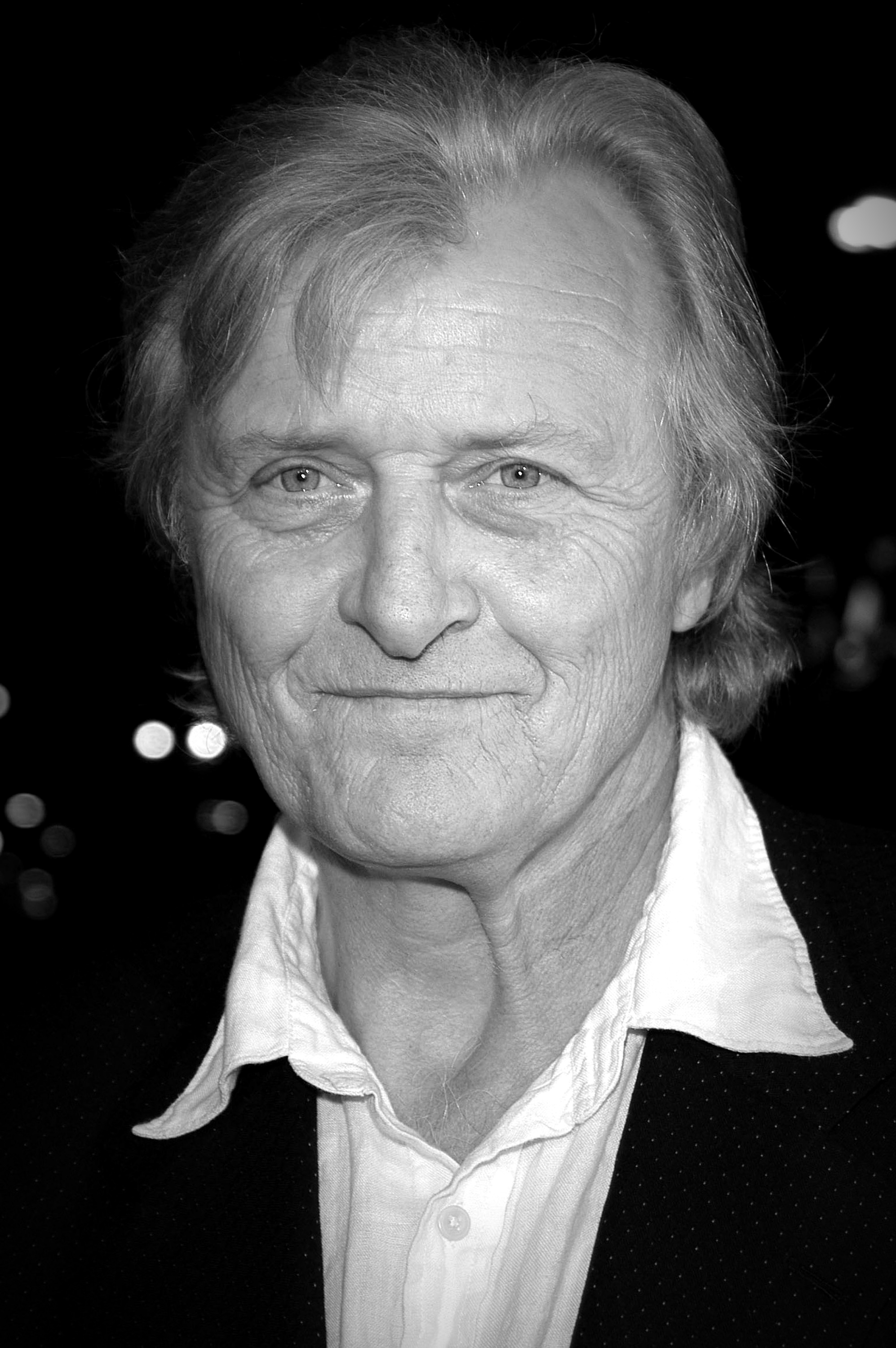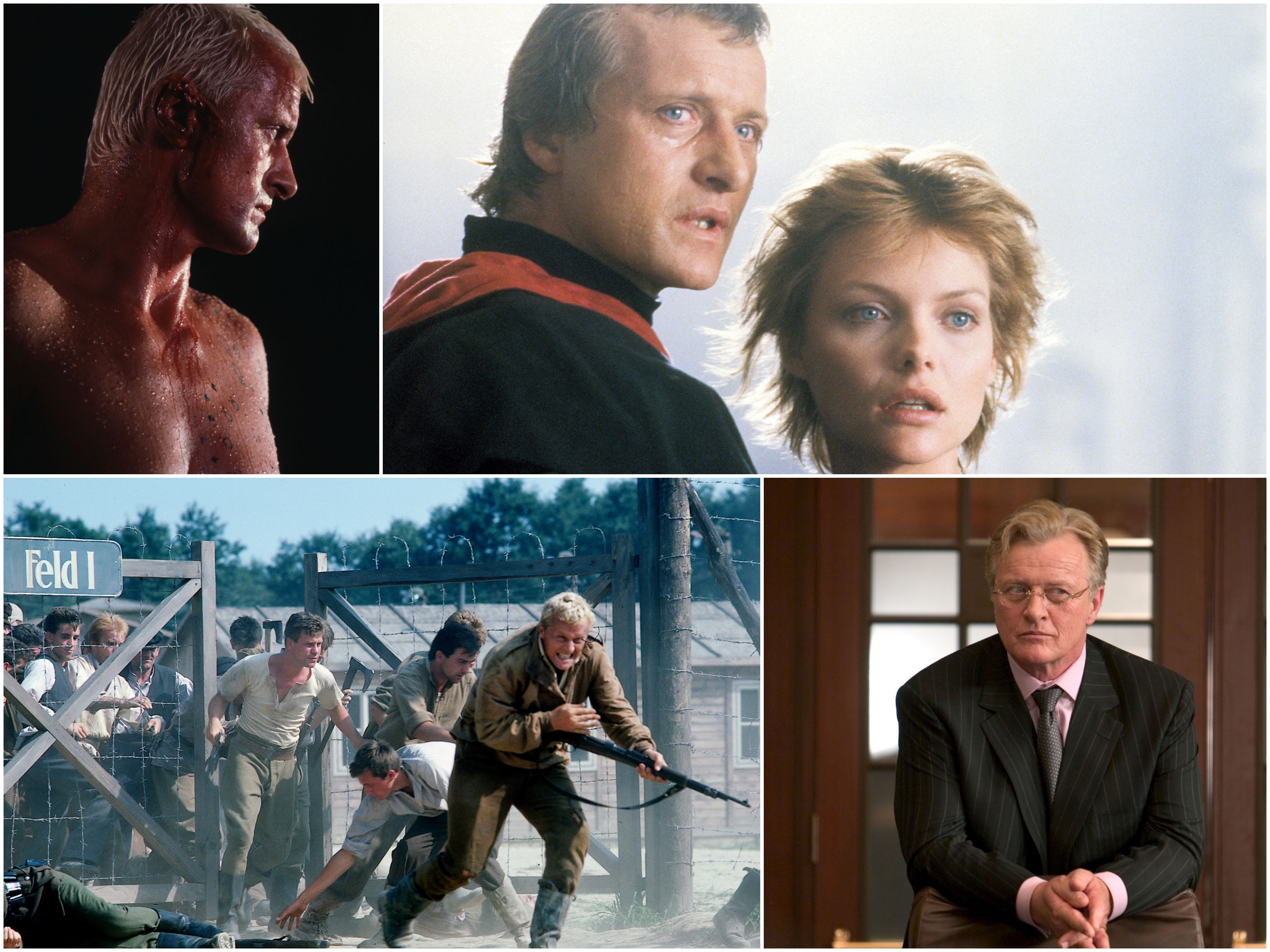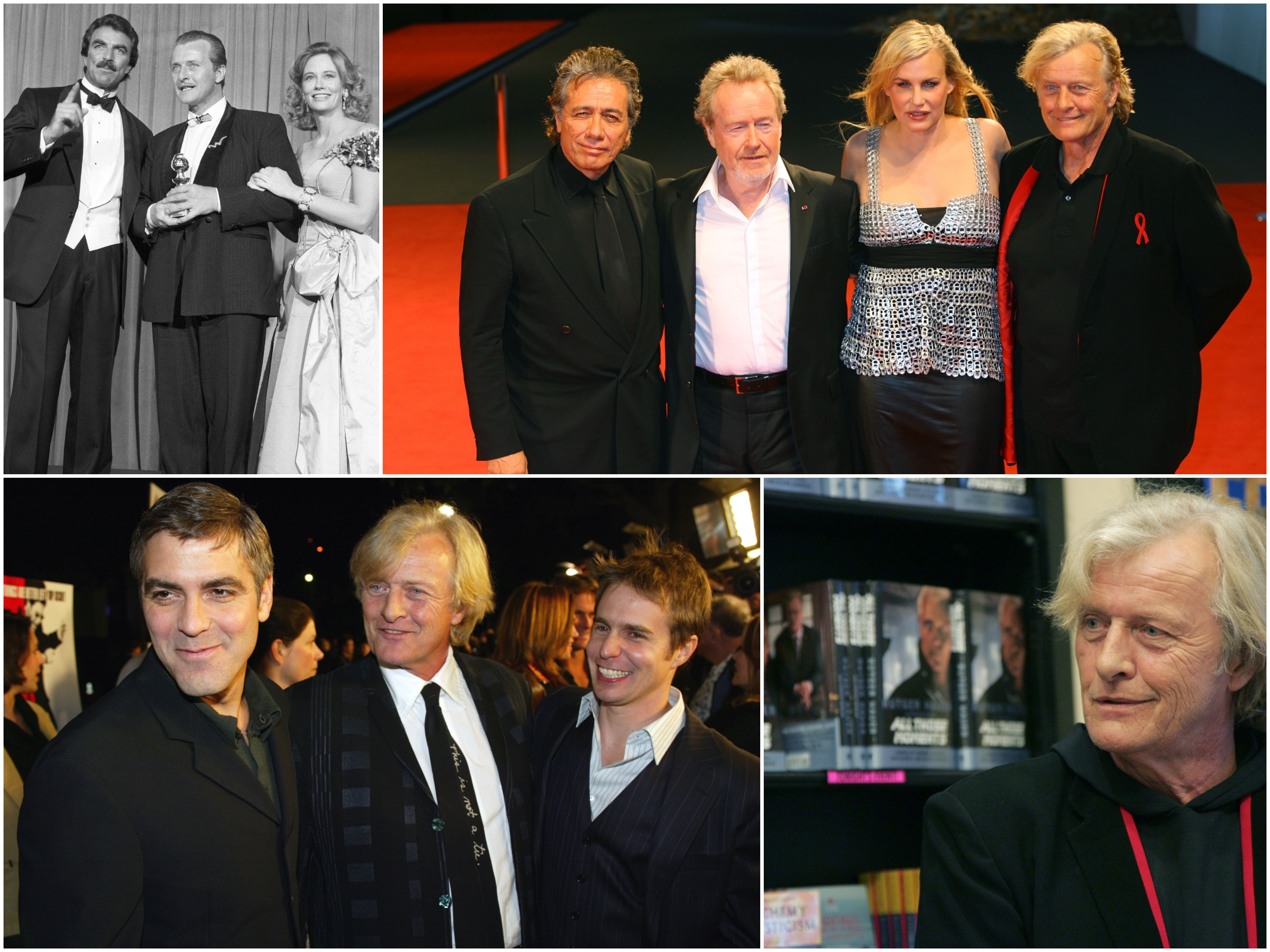
- Industry
Remembering Rutger Hauer, Golden Globe Winner
|
Dutch actor Rutger Hauer, who died aged 75, was the most known and admired performer to come out of the Netherlands. He was equally comfortable acting in Dutch and English language films and TV series and always infused his roles with both action and intellect. His screen career started in 1969, when he essayed the title role in Floris, a Dutch television action series set in the early 16th century, aimed at children but popular with adults too. It gave Hauer a showcase for his physical prowess, with an elaborate sword fight. It was his first collaboration with Dutch director Paul Verhoeven. The two would make five films together, starting with Turkish Delight (1973), the most successful Dutch movie ever, in which he played a bohemian sculptor, in a tempestuous relationship. Last year Hauer told The Hollywood Reporter: ‘At first, I couldn’t understand it. (Now), looking back, it was the start of the sexual revolution, and I was on the cusp of that. I’m naked for three-quarters of the film. In Hollywood, they called it pornography. I saw it 25 years later, in (Hollywood) …and the audience was still shocked. I come from Holland. We’re not shocked.’ The pair followed with the lavish period drama Katie Tippl (1975) and Soldier of Orange (1977), at the time the most expensive Dutch production, and another box office success. It was nominated for a Best Foreign Film Golden Globe (1980) but lost to the French La Cage Aux Folles. Set in Nazi-occupied Holland, it follows a group of students, some Nazi collaborators, and others, resistance fighters. The New York Times noted Hauer’s enigmatic essence, saying that ‘though the screenplay provided him with opportunity to turn matinee idol, Mr. Hauer showed little interest in making himself adorable, and that in itself is intriguing.’ One more sexually explicit movie with Verhoeven, biker drama Spetters (1980) sealed the deal, and Hauer launched his parallel USA career. His first Hollywood film was Nighthawks (1981), playing opposite Sylvester Stallone. Hauer, displaying his versatility, played a callous, psychopathic and cold-blooded yet charming terrorist named Wulfgar, loosely based on the international terrorist Carlos, being chased in New York by Stallone’s cop.’ I was very angry, very aggressive, very alert, very awake. It was pretty tough and very bureaucratic and difficult …fighting Stallone’, he said, ‘I don’t think I’ve been more motivated or done better work’. Hollywood was impressed. The following year he turned down an offer to play the lead in Wolfgang Petersen‘s Das Boot, and instead was cast in Ridley Scott‘s neo-noir sci-fi thriller Blade Runner (1982), as the anti-hero Roy Batty, an eccentric, violent yet sympathetic replicant, arguably his most famous, acclaimed and enduring role. Scott was so impressed with Hauer’s performance in Verhoeven’s movies, that he cast him without meeting him. It turned out to be perfect. Rutger Oelsen Hauer was born on January 23, 1944, near Amsterdam, in Nazi-occupied Holland. His parents were actors who ran a drama school. ‘I was born in the middle of the war, ‘ he said, ‘and I think for that reason I have deep roots in pacifism. Violence frightens me.’ 
Clockwise from left: Blade Runner‘s ‘Tears in the Rain’ monologue; with Michelle Pfeiffer in Richard Donen’s LadyhawkeBatman BeginsEscape from Sobibor. shooting star/warner brothers; 20th century Fox/getty images; shooting star/warner bros.; cbs/getty images
At 15, the restless Hauer left school to work on a freighter and traveled around the world for a year. Back home, he worked odd jobs, briefly studied acting at the Academy for Theater and Dance in Amsterdam but was expelled for missing classes. He enlisted in the Dutch Army, training to be a combat medic. A pacifist, he soon was expelled for ‘psychological unfitness’. He returned to the acting school and graduated in 1967. He spent five years with an experimental pantomime touring troupe, until discovered by then budding director Paul Verhoeven and soon, Hollywood, and worldwide fame for his role in Blade Runner. In the wake of Blade Runner, the versatile Hauer worked steadily in every type of production or role, starting with Nicholas Roeg’s Eureka (1983) a gold rush saga and, in the same year in Sam Peckinpah’s failed swansong, The Osterman Weekend. In 1985 he reunited with Verhoeven for his US directorial debut, Flesh+Blood, a gory medieval drama, and switched gears to play the lover of Michelle Pfeiffer in the period fantasy romance Ladyhawke. Yet again he turned around and in The Hitcher (1986) he played a psychopath, serial killer stalker who hides a victim’s severed fingers in a portion of French fries and tears a woman in half by tying her to two trucks. Critic Roger Ebert called it ‘reprehensible…diseased and corrupt’, but Hauer was not daunted. “I think in my darker characters I go a little further than most American actors,” he said. “Maybe it’s because I’m not afraid of that side of myself.” Hauer continued to mix all genres. The HFPA honored him twice. In 1988, he won the Best Supporting Actor/TV Golden Globe for his role as a Jewish inmate, in the Golden Globe-winning TV movie Escape from Sobibor, based on the largest breakout from a Nazi death camp. He was nominated again for Best Actor, for his role in the Golden Globe-nominated Fatherland (1995) a fantasy drama about the world 20 years after the Nazis have (supposedly) won World War II. He played vampires, first in the original, failed Buffy the Vampire Slayer (1992), and again in some 2013 episodes of the HBO series True Blood), and a vampire hunter in legendary horror director Dario Argento’s Dracula 3D (2012), and the title role in Dracula III: Legacy (2005). He was an assassin in George Clooney’s directorial debut, Confessions of a Dangerous Mind (2003), a villainous, powerful cardinal in Sin City (2005), and a devious corporate executive in Batman Begins (2005). Earlier this year Hauer filmed A Christmas Carol, a TV miniseries, Break, a sports crime drama; Emperor, an adventure thriller; Journey to China, a historical adventure; and Porters, a TV medical comedy series. In his spare time, he did voice-overs and some cameos and commercials and advocated for his Starfish Association, that provides ‘help, attention, and care to children and pregnant women with HIV/AIDS. 
Clockwise from top left: with his Golden Globe in 1988, with presenters Tom Selleck and Cybill Shepherd; in 2007 with Edward James Olmos, Ridley Scott, and Daryl Hannah at the premiere of Blade Runner The Final Cut at the Venice Film Festival; in 2007, signing copies of his autobiography ‘All Those Moments: Stories of Heroes, Villains, Replicants, and Blade Runners’ at Book Soup in Los Angeles; in 2002 with George Clooney and Sam Rockwell at the premiere of Confessions of a Dangerous Mind ain Los Angeles. hfpa archives/chris jackson/Alberto E. Rodriguez/kevin winter/getty images
Hauer’s signature role was the replicant in Blade Runner. It was the deepest, he said, ‘because it was the first time where I just danced with the director and, let’s say, the concept and the tone. I understood, on a very strong level, what he wanted, and by instinct, I gave it to him. Half the time, what the hell did I know? I was just starting out to be an actor right there: If your creative ideas are strangled, that doesn’t work for me. It doesn’t mean I have to be right — that’s not the point at all. It’s just there needs to be a click between the creator and you. That was Blade Runner for me.’ A dystopian fantasy, Blade Runner hit the zeitgeist of the 1980s, as people started to worry about the effects of technology on the environment. Though the film was not a commercial or critical success (the HFPA nominated it only for Vangelis’ score) Hauer’s appearance resonated perfectly with the futuristic new wave, popular at the time, with his platinum hair, black leather trench-coat, and transparent eyebrows. Philip K. Dick, the author of the novel on which Blade Runner was based said ‘It wasn’t about the replicants, it was about what does it mean to be human? (And Hauer was) the perfect Batty — cold, Aryan, flawless.’ Blade Runner was Hauer’s favorite of the many movies he made in his long career. ‘Blade Runner needs no explanation.’ he said ‘ It just is. All of the best. There is nothing like it. To be part of a real masterpiece which changed the world’s thinking. It’s awesome.’ In Blade Runner’s futuristic society Hauer’s Roy Batty is a replicant who revolts against his abbreviated existence by going rogue and demanding a longer lifespan. Discovering that this request is impossible, he crushes his creator’s head with his hands. Batty ends the film not as a full-blown villain but as a sympathetic being, tormented by his own mortality and pursued by Rick Deckard (Harrison Ford) who may or may not be a replicant himself. Instead of killing his pursuer, Roy saves Rick’s life, and in a gripping scene, delivers what is arguably one of the most moving monologues in motion picture history, the often quoted ‘Tears in the Rain’. Hauer altered the speech, originally written by co-screenwriter David Webb Peoples. He did it the night before filming, without telling anyone, because he thought that the speech as written was ‘opera talk …hi-tech speech’ and he decided to ‘put a knife in it’. ‘He made it shorter’, Peoples remembers, ‘and then went on with a couple of lines about memories in the rain. And then he looked at me like a naughty little boy, like he was checking to see if the writer was going to be upset… I didn’t let on, but I was a little upset and threatened by it. Later, seeing the movie, (I realized that ) that was a brilliant contribution… that line about tears in the rain. It is absolutely beautiful.’ And so, it came to pass. In heavy rain, with long pauses between sentences, the replicant reflects about his life and mortality: ‘I’ve seen things you people wouldn’t believe. Attack ships on fire off the shoulder of Orion. I watched C-beams glitter in the dark near the Tannhäuser Gate. All those moments will be lost in time, like tears in the rain. Time to die.’ Goodnight Rutger Hauer, extraordinary actor, dead at 75. |

